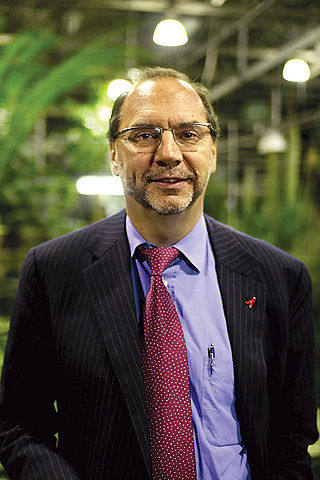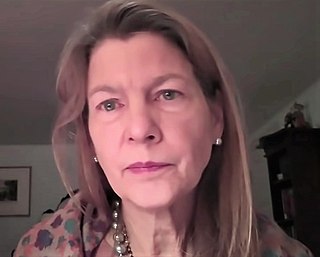
The London School of Hygiene and Tropical Medicine (LSHTM) is a public research university in Bloomsbury, central London, and a member institution of the University of London that specialises in public health and tropical medicine.

Sir Peter Karel, Baron Piot, is a Belgian-British microbiologist known for his research into Ebola and AIDS.
Dame Valerie Beral AC DBE FRS FRCOG FMedSci was an Australian-born British epidemiologist, academic and a preeminent specialist in breast cancer epidemiology. She was Professor of Epidemiology, a Fellow of Green Templeton College, Oxford and was the Head of the Cancer Epidemiology Unit at the University of Oxford and Cancer Research UK from 1989.
Peter George Smith CBE BSc DSc HonMFPHM FMedSci, is an eminent epidemiologist and Professor of Tropical Epidemiology at the London School of Hygiene and Tropical Medicine (LSHTM).
Polly Roy OBE is a professor and Chair of Virology at The London School of Hygiene and Tropical Medicine. She attended a number of schools which included Columbia University Medical School, Rutgers University, University of Alabama, and University of Oxford. In 2001 she became a part of The London School of Hygiene and Tropical Medicine and, along with being the chair of Virology, is also the co-organiser of the medical microbiology course. The virus that she has dedicated most of her career to is Bluetongue disease that affects sheep and cattle. She became interested in this virus after attending a symposium and was intrigued by the fact that not much was known about the virus that was causing such a nasty and sometimes fatal disease.

Vikram Harshad Patel FMedSci is an Indian psychiatrist and researcher best known for his work on child development and mental disability in low-resource settings. He is the Co-Founder and former Director of the Centre for Global Mental Health at the London School of Hygiene and Tropical Medicine (LSHTM), Co-Director of the Centre for Control of Chronic Conditions at the Public Health Foundation of India, and the Co-Founder of Sangath, an Indian NGO dedicated to research in the areas of child development, adolescent health and mental health. Since 2016 he has been Pershing Professor of Global Health and Social Medicine at the Department of Global Health and Social Medicine of Harvard Medical School in Boston. He was awarded a Wellcome Trust Principal Research Fellowship in 2015. In April 2015, he was listed as one of the world's 100 most influential people by TIME magazine.

Christl Ann Donnelly is a professor of statistical epidemiology at Imperial College London, the University of Oxford and a Fellow of St Peter's College, Oxford. She serves as associate director of the MRC Centre for Global Infectious Disease Analysis.
Kaye Wellings is an active Sexual and Reproductive Health educator and has worked within this field of study for over 20 years. She has a strong interest in evaluation research, particularly in relation to preventive intervention and has assessed major national and international sexual health programmes, including AIDS preventive strategies in European countries and the English government's Teenage Pregnancy Strategy. Much of her working life has been spent researching sensitive topics, including not only sexual behaviour but also risk practices relating to drug use and in prison populations and the taboo of birth contraceptives in her early years.

Heidi J. Larson, Lady Piot is an American anthropologist and the founding director of the Vaccine Confidence Project. Larson headed Global Immunisation Communication at UNICEF and she is the author of Stuck: How Vaccine Rumors Start and Why They Don't Go Away. She was recognized as one of the BBC's 100 women of 2021.

Joy Elizabeth Lawn is a British paediatrician and professor of maternal, reproductive and child health. She is Director of the London School of Hygiene & Tropical Medicine Maternal, Adolescent, Reproductive & Child Health (MARCH) Centre. She developed the epidemiological evidence for the worldwide policy and programming that looks to reduce neonatal deaths and stillbirths and works on large-scale implementation research.
Eleanor Mary Riley was Director of the Roslin Institute, Dean of Research at the Royal (Dick) School of Veterinary Studies, and professor of Immunology at the University of Edinburgh. Her research focusses on understanding the immune response of the host to malaria and other diseases using human data and mouse models.
Elizabeth Lucy Corbett is a British epidemiologist who is Professor of Tropical Epidemiology at the London School of Hygiene & Tropical Medicine. Her research investigates the regulation of tuberculosis in HIV prevalent populations and improving access to HIV self-testing.
Hazel Marguerite Dockrell is an Irish-born microbiologist and immunologist whose research has focused on immunity to the human mycobacterial diseases, leprosy and tuberculosis. She has spent most of her career at the London School of Hygiene and Tropical Medicine, where as of 2020 she is a professor of immunology. She was the first female president of the Royal Society of Tropical Medicine and Hygiene. Jimmy Whitworth of the Wellcome Trust describes her as "a marvellous ambassador for global health and research."
Azra Catherine Hilary Ghani is a British epidemiologist who is a professor of Infectious Disease Epidemiology at Imperial College London. Her research considers the mathematical modelling of infectious diseases, including malaria, bovine spongiform encephalopathy and coronavirus. She has worked with the World Health Organization on their technical strategy for malaria. She is associate director of the MRC Centre for Global Infectious Disease Analysis.
The Scientific Advisory Group for Emergencies (SAGE) is a British Government body that advises central government in emergencies. It is usually chaired by the United Kingdom's Chief Scientific Adviser. Specialists from academia and industry, along with experts from within government, make up the participation, which will vary depending on the emergency. SAGE gained public prominence for its role in the 2020 COVID-19 pandemic in the United Kingdom.
Helena Legido-Quigley is a Spanish public health researcher who is an associate professor in Health Systems at Saw Swee Hock School of Public Health at the National University of Singapore. She serves as an associate fellow of Chatham House and is a member of the Council of the World Economic Forum. She is editor-in-chief of Elsevier's Journal of Migration and Health.
Claire Bayntun is a British physician specialised in global public health, director of Global Leadership Programmes, assistant professor at the London School of Hygiene & Tropical Medicine, advisor on health security and health protection, and trained mentor who coaches health leaders. She is vice-president of the Royal Society of Medicine, London.
Linda Sharples is a British statistician who is Professor of Medical Statistics at the London School of Hygiene & Tropical Medicine. Her research considers statistical analysis of medical interventions. She has provided expert advice to clinical trials on cardiovascular disease, diabetes and cancer.
Cathy Lynn Zimmerman is a social scientist and professor at the London School of Hygiene and Tropical Medicine (LSHTM). She founded the LSHTM Gender Violence & Health Centre. Her research investigates migration, violence and health.
Heidi Stöckl is a German researcher and sociologist at the Ludwig Maximilian University of Munich. Her research investigates gender-based violence and human trafficking. She has previously worked at the London School of Hygiene and Tropical Medicine and with the World Health Organization on the design and implementation of strategies to end violence against women.






